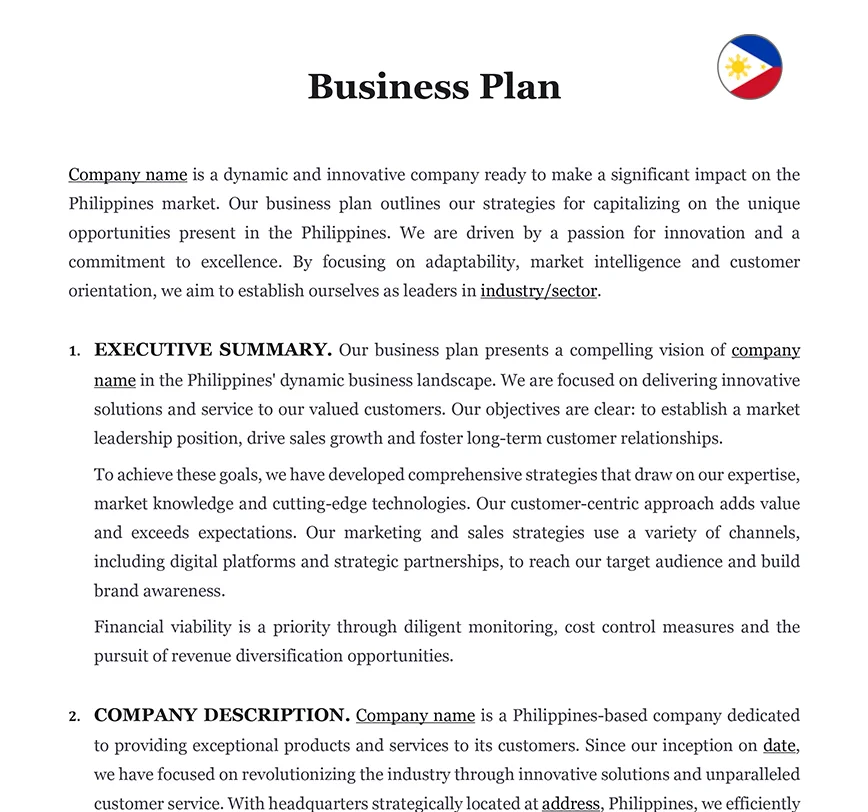Ready to use legal template
Drafted by experienced lawyers
Compliant with Filipino law
Ready to use legal template
Drafted by lawyers
Compliant with Filipino law
Home › Business contracts › Business Plan
Learn more about Business Plan in Philippines
Using a business plan in the Philippines is crucial for several reasons. Firstly, a business plan serves as a roadmap that outlines the goals, strategies, and financial projections for a business venture. It helps to clarify the direction and vision of the business, ensuring that all stakeholders are aligned. Additionally, a well-developed business plan is often required when seeking financing from banks, investors, or government institutions. It demonstrates the feasibility and potential profitability of the business, increasing the chances of obtaining funding. Themis Partner helps you draft the best business plan for your company while being fully compliant with Philippines Laws.
Table of contents
-
What is a Business Plan?
-
When do you use Business Plan for your business?
-
Why is a business plan important for success?
-
What does a business plan include in the Philippines?
-
How to make a business plan for the Philippine market?
-
What are the tips for writing a business plan for startups?
-
How important is market research in developing a business plan?
-
How to incorporate financial projections into my business plan?
What is a Business Plan?
A business plan is a comprehensive document that outlines the goals, strategies, and financial projections of a business. It serves as a roadmap for entrepreneurs, providing a clear vision of their business idea and how they plan to achieve success. A well-crafted business strategy roadmap includes sections such as an executive summary, company description, market analysis, marketing strategies, organizational structure, financial projections, and more. It helps entrepreneurs articulate their business concept, understand their target market, identify potential challenges, and plan for growth and sustainability.
When do you use Business Plan for your business?
Business plans are typically used in various scenarios throughout the lifecycle of a business. They are essential when starting a new venture as they provide a blueprint for success, helping entrepreneurs secure funding from investors or financial institutions. A business plan is also beneficial when seeking partners or collaborators, as it outlines the business’s potential and growth prospects. Moreover, established businesses can use these strategic roadmaps to strategize for expansion, diversification, or entering new markets. Additionally, a strategic roadmap can be periodically reviewed and updated to assess progress, make necessary adjustments, and attract new investors or stakeholders.
Why is a business plan important for success?
A comprehensive business plan is vital for success in the Philippines due to several reasons. Firstly, it helps entrepreneurs gain a deep understanding of the local market dynamics, consumer behavior, and competition. The Philippine market is diverse and rapidly evolving, making market knowledge crucial for business sustainability. A well-researched business strategic roadmap allows entrepreneurs to identify and capitalize on market opportunities, mitigate risks, and make informed decisions. The business strategic roadmap is essential for attracting investors in the Philippines. Investors often require a thorough strategic roadmap to assess the viability and potential of a venture. A comprehensive plan demonstrates professionalism, preparedness, and a strategic approach to business development. It provides investors with the necessary information to evaluate the financial projections, growth prospects, and return on investment. A strategic roadmap serves as a roadmap for entrepreneurs, outlining their goals, strategies, and milestones. It helps in aligning the efforts of the entire organization and provides a basis for decision-making. A well-structured plan enhances operational efficiency, resource allocation, and risk management, ultimately contributing to the overall success of the business in the dynamic Philippine market.
What does a business plan include in the Philippines?
By incorporating these key elements into your business plan, you can create a comprehensive and tailored document that addresses the specific needs of ventures in the Philippines. This ensures that your document aligns with the local market dynamics, consumer preferences, and regulatory environment, increasing the chances of success.
1. Executive Summary: This section provides a concise overview of the business, its mission, vision, unique selling proposition, and key highlights.
2. Company Description: Describe the nature of the business, its legal structure, products or services offered, and the target market in the Philippines.
3. Market Analysis: Conduct a thorough analysis of the Philippine market, including market size, growth trends, customer demographics, and competitive landscape.
4. Marketing and Sales Strategies: Outline your marketing and sales approach, including pricing strategies, distribution channels, promotional activities, and customer acquisition plans.
5. Organizational Structure: Define the organizational structure of your business, including key management personnel, their roles, and responsibilities.
6. Product or Service Offering: Provide detailed information about your products or services, including their unique features, benefits, and competitive advantages in the Philippine market.
7. Financial Projections: Include financial statements, such as income statements, balance sheets, and cash flow projections, to showcase the financial feasibility and profitability of the venture.
8. Risk Assessment and Mitigation: Identify potential risks and challenges that may impact your business in the Philippine market and outline strategies to mitigate them.
9. Implementation Plan: Outline the steps and timelines for executing your document, including key milestones and resource requirements.
How to make a business plan for the Philippine market?
Step 1. Executive Summary
Provide an overview of your business idea, including your goals, target market, and unique value proposition for the Philippine market.
Step 2. Market Analysis
Conduct comprehensive research on the Philippine market, including customer demographics, buying behaviors, cultural nuances, and trends. Identify market gaps, competition, and potential opportunities specific to the Philippines.
Step 3. Business Concept and Value Proposition
Clearly articulate your business concept and how it addresses the needs of the Philippine market. Highlight your unique value proposition and how it differentiates you from competitors.
Step 4. Marketing and Sales Strategy
Outline your marketing and sales strategies tailored to the Philippine market. Define your target customers, pricing strategy, distribution channels, and promotional activities. Consider leveraging digital marketing platforms, local partnerships, and culturally relevant marketing approaches.
Step 5. Operational Plan
Detail the operational aspects of your business, including location, facilities, equipment, and production processes. Consider local regulations, permits, and licensing requirements that Philippines Laws may apply.
Step 6. Organization and Management
This document may indicate stability for your firm by demonstrating that you have planned ahead of time so that any issue can be resolved easily and quickly. This is very crucial for banks and other creditors who may be interested in investing in your firm.
Step 7. Product or Service Offering
Provide a comprehensive description of your products or services and how they meet the needs of the Philippine market. Highlight any customization or localization efforts specific to the local preferences and cultural context.
Step 8. Financial Projections
Develop realistic financial projections, including sales forecasts, expense estimates, and projected profitability. Consider local market conditions, pricing dynamics, and costs specific to the Philippine market.
Step 9. Risk Assessment and Mitigation
Identify potential risks and challenges that your business may face in the Philippine market. Develop strategies to mitigate these risks, such as contingency plans, partnerships, or diversification strategies.
Step 10. Implementation Plan
Create a step-by-step action plan outlining the tasks, timelines, and responsibilities for launching and operating your business in the Philippine market. Include milestones and measurable goals to track your progress.
ℹ️ Themis Partners legal experts also help you in your company registration so it helps you select the right type of company and ensure a full compliance to the Philippine Laws.
What are the tips for writing a business plan for startups?
Writing an effective business plan for startups in the Philippines requires a focused and strategic approach. Begin by clearly articulating your business concept, value proposition, and target market, emphasizing what sets you apart from local competitors. Conduct thorough market research to understand customer needs and preferences, and tailor your products or services accordingly. Outline your marketing and sales strategies, incorporating digital marketing techniques and innovative promotional campaigns to reach and attract your target customers. Showcase your understanding of the local competitive landscape and explain how your startup will gain a competitive edge. Present a comprehensive financial plan with realistic revenue projections, expense forecasts, and a clear path to profitability. Highlight the qualifications and experience of your team, demonstrating their commitment to the success of the startup. By following these tips, you can create a compelling strategic roadmap that resonates with potential investors and stakeholders in the Philippines.
How important is market research in developing a business plan?
Market research and analysis play a critical role in developing a business plan for the Philippine market. It provides valuable insights into customer preferences, market trends, competition, and industry dynamics. Here’s why market research is important:
| ➤ Understanding the Target Market: Market research helps you gain a deep understanding of your target market in the Philippines. It provides insights into consumer behavior, preferences, buying patterns, and trends. This knowledge enables you to tailor your products, services, and marketing strategies to meet the specific needs and preferences of the local customers. |
| ➤ Identifying Market Opportunities: Market research helps you identify untapped market segments, niche markets, or emerging trends in the Philippines. It enables you to identify gaps in the market and develop innovative solutions that meet the demands of the local customers. |
| ➤ Assessing Competition: Market research allows you to analyze the competitive landscape in the Philippines. By studying your competitors' strengths, weaknesses, market positioning, and strategies, you can identify opportunities for differentiation and develop a competitive advantage. |
| ➤ Mitigating Risks: Market research helps in identifying potential risks and challenges in the Philippine market. By understanding market dynamics, regulatory requirements, and consumer preferences, you can proactively address potential risks and develop mitigation strategies. This includes anticipating changes in market conditions, staying updated on industry trends, and adapting your business strategic roadmap accordingly. |
| ➤ Validating Business Assumptions: Market research provides a platform to test and validate your business assumptions in the Philippine market. By gathering data and feedback from potential customers, you can assess the market demand for your products or services, identify any necessary adjustments, and make informed decisions. |
| ➤ Supporting Decision-Making: Market research serves as a foundation for informed decision-making throughout the business planning process. It provides data-driven insights and helps you make strategic choices regarding target market selection, pricing strategies, marketing channels, and more. This enhances the overall effectiveness and success of your strategic roadmap. |




